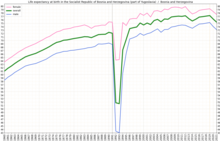
Health in Bosnia and Herzegovina was impacted by the Balkan War of the early 1990s, during which Bosnia and Herzegovina declared their independence. Bosnia faced many challenges during the war, including bombings throughout the country that ruined much of the infrastructure. Parallel regimes took over Bosnia and flipped the country upside down with land mines, bullets, and bombings. The war displaced over 800,000 refugees and killed over 100,000 people.[1] The war in Bosnia also consisted of an ethnic "cleanse" of Bosnian Muslims initiated by Bosnian Serbs, which included containment of Bosniaks in concentration camps. The war ended with NATO involvement and the Dayton Agreement in 1995.[1] The Dayton Agreement acknowledges Bosnia and Herzegovina as a democratic country and the country is moving toward the basic principals that accompany that, such as civil rights and equality. During the war there was minimal attention given to the standard of health and major public health concerns, such as pest control, hygiene, disinfection, and import and export programs, were all interrupted or stopped.[2] The war affected Bosnia in many ways. The war torn country not only lost much of the infrastructure, but the economy and the governmental system were also affected. It is estimated that there are still thousands of people living as refugees and a large portion of the population still fall under the United Nations High Commission of Refugees category of a refugee or displaced person.[3] The shortcomings of the current health care system include the lack of communication between health care centers, lack of skills, and lack of standards that are uniform throughout the country.[2]
The Human Rights Measurement Initiative[4] finds that Bosnia and Herzegovina is fulfilling 70.1% of what it should be fulfilling for the right to health based on its level of income.[5] When looking at the right to health with respect to children, Bosnia and Herzegovina achieves 99.6% of what is expected based on its current income.[6] In regards to the right to health amongst the adult population, the country achieves only 95.6% of what is expected based on the nation's level of income. [7] Bosnia and Herzegovina falls into the "very bad" category when evaluating the right to reproductive health because the nation is fulfilling only 15.0% of what the nation is expected to achieve based on the resources (income) it has available.[8]
- ^ a b "Bosnia-Herzegovina." United States Holocaust Memorial Museum. United States Holocaust Memorial Council, n.d. Web. 09 May 2014.
- ^ a b Cain, J. et al. In Cain, J. and Jakubowski, E., eds. Health care systems in transition: Bosnia and Herzegovina. Copenhagen, European Observatory on Health Care Systems, 4(7) (2002).
- ^ Cain, J. et al. In Cain, J. and Jakubowski, E., eds. Health care systems in transition: Bosnia and Herzegovina. Copenhagen, European Observatory on Health Care Systems, 4(7) (2002).
- ^ "Human Rights Measurement Initiative – The first global initiative to track the human rights performance of countries". humanrightsmeasurement.org. Retrieved 2022-03-13.
- ^ "Bosnia and Herzegovina - HRMI Rights Tracker". rightstracker.org. Retrieved 2022-03-13.
- ^ "Bosnia and Herzegovina - HRMI Rights Tracker". rightstracker.org. Retrieved 2022-03-13.
- ^ "Bosnia and Herzegovina - HRMI Rights Tracker". rightstracker.org. Retrieved 2022-03-13.
- ^ "Bosnia and Herzegovina - HRMI Rights Tracker". rightstracker.org. Retrieved 2022-03-13.